Thank you to the Whyte Museum of the Canadian Rockies for granting permission to the Park Warden Service Alumni to post this interview on our website.
Park Warden Alumni Society of Alberta
Oral History Phase 10 Fall 2020
Phone Interview with Doug Martin
Date/time: November 5th 2020 @ 1000
Interviewed by Monique Hunkeler
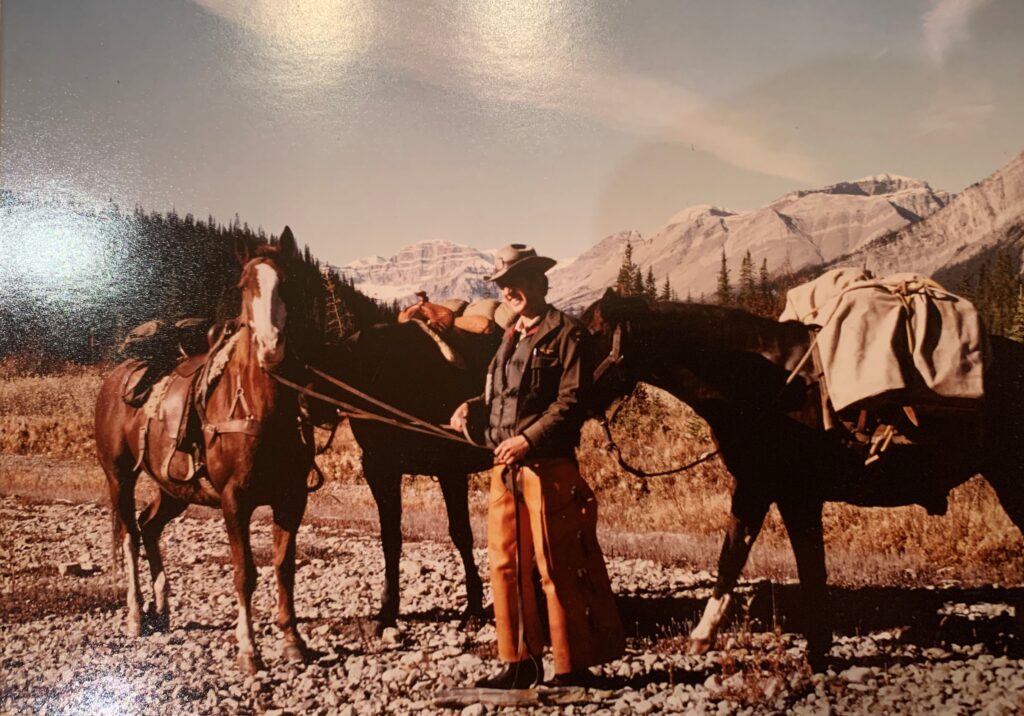
Doug Martin
Place and date of birth? Doug was born in Kimberley, British Columbia on July 17, 1950
MH: Where did you grow up?
DM: I grew up in Kimberley.
MH: How did you become involved in the Warden Service? Which national park did you start working in?
DM: Growing up, Kimberley was a small mining town and my parents always wanted to encourage us to swim and all of that and the only pool available in the East Kootenays in the winter was in Radium. That was my first exposure to Park Wardens in Kootenay National Park at Radium. I saw these guys in green trucks and I became interested. My dad told me they were like forestry rangers but worked only in the National Parks. And so that was where my interest started. We visited Kootenay and camped there frequently and I became interested in becoming a conservation officer or a park warden through that. That had always been my idea of a great job. In school they had those aptitude tests and mine always came out to be in this line of work, Conservation Officer or Park Warden. My parents were very outdoor oriented. I grew up doing a lot of camping, fishing and hunting. My dad worked for Cominco, he was a fabricator. My grandfather came to Kimberley as a machinist/engineer but was also very outdoor oriented to fishing and hunting. He was the president of the local Fish and Wildlife organization for many years and was always pushing for protection of wildlife, building goose boxes or fish spawning area like those at Premier Lake. My Dad helped with the building of the ski lifts, the old T-bar at Kimberley as the hill was a community project. So that is where my interests in the outdoors and fish and wildlife and of course, skiing, came from.
MH: What made you want to join the Warden Service? 0436:
DM: I’ve always been a strong believer in the “land set aside for future generations, to be left unimpaired” and I really believed in the dedication clause of the National Parks Act and it’s a true bible of National Parks to me. I really thought those who set aside the 4 mountain park block had such futuristic thoughts, they were extremely brilliant in my opinion, to preserve this land in the heart of Canada at the headwaters of our major water systems. In Canada, we are able to go out into nature and not have to go into meditation to get to these highly beautiful areas. In setting that land aside and creating the dedication clause of the National Park Act was genius and is something I cherish.
MH: What different parks did you work in? How did they compare? Do you have a favourite? 0620:
DM: Because of that interest, I started in trail crew in Kootenay National Park and worked for a warden named Terry Gibbons and the guy in charge of trail crews at the time was Cecil Cooper, Lance Cooper’s dad. That summer furthered my interest in wanting to be a Park Warden. I graduated from the University of Victoria with a Bachelor of Science in Zoology. It was difficult in the early 1970s to apply for National Park Warden jobs because they were very regionally located and the four mountain parks were controlled out of Calgary and didn’t stretch over into the West and the West coast. It took a couple of years of searching down actively to get an application accepted. So I started in Kootenay as a back country trail crew foreman for one summer and then my first Warden position was in Waterton Lakes National Park (spring of 1974). After spending my seasonal career there (4 years), I moved to Banff as a permanent warden in the fall of 1978.
Kootenay was sort of the place where I started but was limited for me because I was only a trail crew person. But Waterton was my first as a warden and it was when Dale and I became married in 1974 and moved there. Our two children were born while we were there. Waterton Lakes itself is a beautiful park with its theme of “Where the prairies meet the Mountains” and is very special to me. The wildlife and the vegetative landscape of the two zones, having the abundant different species of plants and animals was breathtaking. But it was very small and very tiny in so many respects. And then you go to Banff with its huge landscapes, the backcountry travel from the Bow Valley to the Clearwater, and the wilderness areas of the Clearwater. Banff is very special to me as well. I don’t really have a favourite; they are all my favourites. And whether I’m here or in a National Park in another country, that land set aside is special to me, once you are inside that boundary. Leaving it unimpaired for future generations is an important concept that I’ve always liked.
MH: What were some of your main responsibilities over the years? 0800:
DM: I always wanted to do all of it. I was a real generalist in thought and I enjoyed all aspects of the Warden Service. So, in Waterton, I did wildlife and fisheries work and played with things I’d learned about in University. In Banff I performed similar functions in that I did fisheries at Minnewanka and really enjoyed the aspects of trying to figure out the life of lake trout. I worked with grizzly bears and wolves with Paul Paquet…and the backcountry, I loved going into the backcountry in the summer and working the ski hill in the winter doing avalanche control. It was great to be able to traipse around the park and was fortunate to climb so many peaks from Banff to Jasper and even a few others outside of our parks. That physical aspect I thoroughly enjoyed. It was very difficult for me to leave those areas of the job as I progressed through the years to other aspects of the warden position. And then in the end, I was the Law Enforcement Specialist in Banff. I never had the aspirations to be the Chief Park Warden or anything like that. I know many people did. I had my Bachelor of Science degree from University of Victoria in Zoology and pre-med and could have transitioned to management I guess but I wasn’t interested. In my opinion I got paid to play, to do the things I loved.
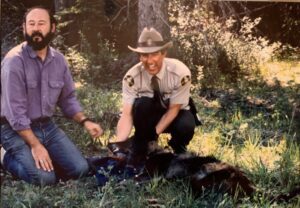
Paul Paquet, Doug Martin and “Betty” the wolf
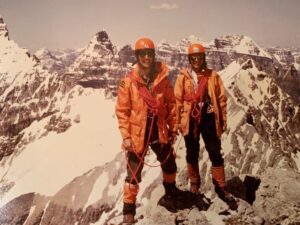
Peter Fuhrmann and Doug Martin Valley of the 10 peaks
MH: What did you like / Dislike about being a warden? 1100:
DM: I got paid to play and the physical activities. I am really strong about that dedication clause and I think it was that that was very important to me. There was always a little bit of anxiety in the spring and the fall as to where you were going to get assigned; hoping to continue on in the avalanche control at the ski area or backcountry district in the summer.
I guess I disliked the political aspect coming down from Ottawa and into the Warden Service. As we became an agency, that really came down to the lower levels and affected us. As I progressed along, and within the union aspect as well, I learned that there were people (superintendents, managers all the way through) who were against the “Green Machine” because it was perceived that the Warden Service was a force to be dealt with. However, all the Warden Service was doing was upholding the National Parks Act with all the environmental controls and the Public Safety stuff, all of that came as a result of the National Parks Act. I couldn’t figure out why the politicians and then the managers would bend from that. That always confused me and that was something I really did not enjoy. It spilled over into some difficult times. Some actions that I perceived from some of the managers and politicians were in contradiction to the National Parks Act.
MH: What were some of your more memorable events as a Warden? 1420:
DM: I remember sitting on the porch at Bryant Creek and Prime Minister Pierre Elliott Trudeau came riding up with Ron Warner. I had a beer and chatted with him. That was kind of fun and interesting. It was unknown that he was coming and that was a unique thing.
Rescues in the winter time; the weekends were always tumultuous in the 1970s and 1980s in the sense that you just waited for the next accident to occur. Incidents like the Bourgeau accident which resulted in the movie documentary “Swept Away”. At that time a lot of people were getting into the backcountry and there were a lot of accidents. It was difficult getting information out about avalanche safety, to help the general public become more aware. Being at the Stanley Glacier accident, leaving there at night and the next day seeing the hazard, bombing it, and realizing right where we had been standing and working was buried in 10 feet of more snow and thinking, “Holy Shit”.
There were many memorable times like climbing schools and being able to get together with other Park Wardens in the deep snow schools at Rogers Pass.
Being at the ski hill doing avalanche control, we always were able to run away and get some good powder runs at Rogers Pass (under the guise of training) was a good perk.
I remember one incident with Paul Paquet. We’d finally trapped a wolf we named Betty (after Betty Williamson, a former dispatcher) near Sunshine and putting a collar on this wolf one morning. I said to Paul, “How are we going to do this?” as the wolf was in a foot snare and he said, “simple.” We literally broke a fork stick, pinned the wolf to the ground, put a collar on it and backed off and let it run away. It was amazing-no drugs. In that same couple of years, I worked on projects with bears, looking at the Eco sites that they utilized at various times of the year and we collared bears using the telemetry system. The bear almost seemed to know us. They would sense us. You would walk in and all of a sudden the bear would do a 360 then stop. It smelled you and knew you weren’t a threat. That was exhilarating and it was fascinating work. It was tumultuous to switch to an office position.
Willi Pfisterer was such a grand old master. I went on the 8 pass route quite a few times and climbed at the Icefields with him. He came down to Waterton when I was a Warden there and it was first time I met him. In the old days when we wore knickers for climbing Willi was the only one allowed to wear red socks as he was the alpine specialist. A few people always joked and we would put on one green sock and one red just to bug him. I had a great deal of respect for him.
Back to Trudeau, when we were in Waterton, Dale worked at the Information Bureau and she was a seasonal and could not get unemployment in winter so she ended up phoning the Prime Minister of Canada, and talked to him directly. Now how can that happen today? But she told him about her problem in Waterton and he helped directly. She phoned back a second time when she got unemployment insurance, to thank him and they got into this big conversation about what the weather was like, what I was doing and what was happening in the National Parks that were important to her. Dale phoned him back a third time when we were thinking about applying for one of the houses in the Valleyview development in Banff. Dale asked Trudeau if Valleyview was going to be the last of the development in Banff. People were really against it. We wanted to know whether or not it would be detrimental to Banff National Park, having to expand the boundaries of the town, etc…we were very idealistic. Trudeau had a good laugh and said, “Well you just made my day.” and of course, it is going to be detrimental because we are taking away areas from the National Park, but people need to live and work there and he said, “go for it”. So we bought our house in Valleyview! He did remember Dale and he said, “Is this Dale from Waterton?” so it was very cool. Could you do that today? Could you call his son?? Doubt it. I can’t even get ahold of Telus.
Another story, because I liked water, I trained in Calgary with the water rescue team, and on the night of my son’s graduation from high school we had a vehicle in the water above Bow Falls. We had a rescue where I slung on top of this vehicle above the falls to see if there were any people in it who needed to be helped out. It was pretty dramatic as we hadn’t done anything like that before. Dale was at the graduation which was being held at the Banff Springs Hotel and waiting for me to come but then saw the helicopter with someone slinging underneath it. She knew that it was me as I had just been trained for that. I guess it provided some entertainment for the graduates getting ready for their ceremony. I was a little late for the ceremony but thankfully the vehicle was empty.
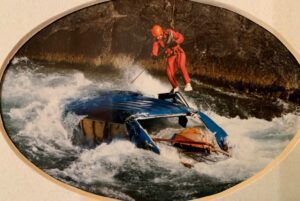
Bow Falls slinging over car looking for people
MH: Can you tell me about any rescue/wildlife stories that stick out in your memory? 2720:
DM: That was one of them for sure…that was a big one. There was an accident on Mt Assiniboine where a couple of guys had climbed the peak and one tried to glissade down above the red band and of course did not make it. I went in with Peter Fuhrmann to pick up the body, but also was dealing with the aftermath and the surviving climbing partner. We brought him out and I’ve always regretted that I didn’t invite him home to my family after such a tragedy but with the little kids and Dale and trying to keep that trauma away from the family, I didn’t. I should have taken this poor individual who had lost his partner, and I didn’t give him the humanity that he deserved. He was by himself that night in Banff. That’s been a bit of a sadness in my career.
MH: How did the Warden Service change over the years? 3030:
DM: I was one of the few people in the early 1970s who got hired on with a bachelor’s degree in science. I went to university because of encouragement from my family but I did not want to be a biologist or a scientist only. I used my education in my career but still wanted to perform all aspects of the job. People didn’t want to go out into the park land to do the patrolling and perform outside duties as much as the previous wardens had. The sciences were and still are important and the professionalizing of the Warden service was important too but I still thought that the Warden Service had Public Safety, Law Enforcement, Resource Management and those were the core parts and all equally important. There were many people, as the Warden Service progressed, who did not want to do that, they wanted to specialize and only focus on one element of it. When I think of the rescues and the searches I’d been on with Tim Auger, I knew the professional and training aspect of Public Safety was essential and important. Not only did the skill level of Wardens need to increase, we needed the training to go along with that. Those experts like Tim Auger, brought that to us. Keith Everts was paramount in pushing and trying to improve that aspect of the Warden Service and I have a great deal of respect for Keith. It was necessary to improve the Warden training to be able to meet the needs of protecting the park in the best ways possible whether through fire management or law enforcement in which I was involved. It did change though and it was the sad part of the change in the sense that it took away from the idea that “I’m a Park Warden and I can do it all.”

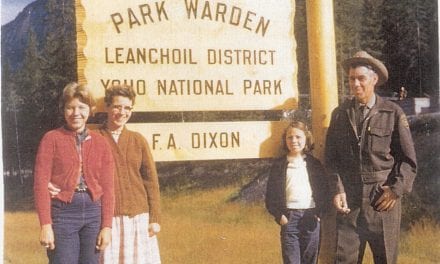
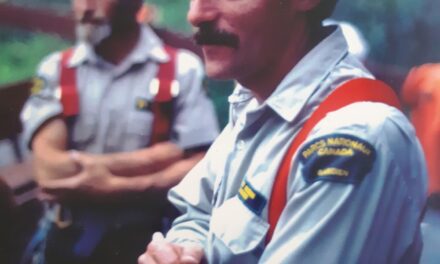
How are you.
Do you still have your special riding boots
Hope all is well
Kudos on the Doug Martin interview. A lifetime of living. Thank you to the Alumi.